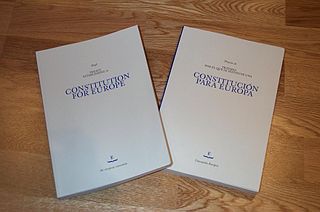| |||||
| Decades: | |||||
|---|---|---|---|---|---|
| See also: | |||||
The following lists events that happened during 2005 in the Grand Duchy of Luxembourg.
| |||||
| Decades: | |||||
|---|---|---|---|---|---|
| See also: | |||||
The following lists events that happened during 2005 in the Grand Duchy of Luxembourg.
Luxembourg is a parliamentary representative democratic monarchy, whereby the prime minister is the head of government, and the multi-party system. Executive power is under the constitution of 1868, as amended, exercised by the government, by the grand duke and the Council of Government (cabinet), which consists of a prime minister and several other ministers. Usually, the prime minister is the leader of the political party or coalition of parties having the most seats in parliament. Legislative power is vested in both the government and parliament. The judiciary is independent of the executive and the legislature.

Cargolux, legally Cargolux Airlines International S.A., is a flag carrier cargo airline of Luxembourg with its headquarters and hub at Luxembourg Airport. With a global network, it is among the largest scheduled all-cargo airlines in the world. Charter flights and third party maintenance are also operated. It has 85 offices in over 50 countries as of 2018, and operates a global trucking network to more than 250 destinations.

The Treaty establishing a Constitution for Europe was an unratified international treaty intended to create a consolidated constitution for the European Union (EU). It would have replaced the existing European Union treaties with a single text, given legal force to the Charter of Fundamental Rights, and expanded qualified majority voting into policy areas which had previously been decided by unanimity among member states.

Jean-Claude Juncker is a Luxembourgish politician who was the 23rd prime minister of Luxembourg from 1995 to 2013 and 12th president of the European Commission from 2014 to 2019. He also was Finance Minister from 1989 to 2009 and President of the Eurogroup from 2005 to 2013.

Luxembourg Airport is the main airport in Luxembourg. Previously called Luxembourg Findel Airport due to its location at Findel, it is Luxembourg's only international airport and is the only airport in the country with a paved runway. It is located 3.25 NM east of Luxembourg City. In 2019, it handled 4.4 million passengers. It is a major cargo airport, ranking as Europe's fifth-busiest by cargo tonnage and the world's 28th-busiest in 2010. Luxair, Luxembourg's international airline, and cargo airline Cargolux have their head offices on the airport property.

This is a list of referendums related to the European Union, or referendums related to the European Communities, which were predecessors of the European Union. Since 1972, a total of 48 referendums have been held by EU member states, candidate states, and their territories, with several additional referendums held in countries outside the EU. The referendums have been held most commonly on the subject of whether to become a member of European Union as part of the accession process, although the EU does not require any candidate country to hold a referendum to approve membership or as part of treaty ratification. Other EU-related referendums have been held on the adoption of the euro and on participation in other EU-related policies.

A referendum on ratifying the proposed European Constitution was held in Luxembourg on 10 July 2005. The referendum was Luxembourg's first since 1937. On 28 June 2005 Parliament approved the constitution in advance of the referendum, and although the referendum was consultative, parliament agreed to abide by the results.
The Irish referendum on the Treaty establishing a Constitution for Europe was a vote that was planned but did not occur. The referendum was expected to take place in 2005 or 2006 to decide whether Ireland should ratify the proposed EU Constitution. Following the rejection of the Constitution by voters in the French referendum of May 2005 and the Dutch referendum of June 2005, the planned Irish referendum was postponed indefinitely.
The following lists events that happened during 2006 in the Grand Duchy of Luxembourg.
The following lists events that happened during 2004 in the Grand Duchy of Luxembourg.
The following lists events that happened during 2003 in the Grand Duchy of Luxembourg.
The following lists events that happened during 2001 in the Grand Duchy of Luxembourg.
Events from the year 2005 in the European Union.

The first Juncker–Asselborn Government was the government of Luxembourg between 31 July 2004 and 23 July 2009. It was led by, and named after, Prime Minister Jean-Claude Juncker and Deputy Prime Minister Jean Asselborn.

The Juncker–Polfer Government was the government of Luxembourg between 7 August 1999 and 31 July 2004. It was led by, and named after, Prime Minister Jean-Claude Juncker and Deputy Prime Minister Lydie Polfer.

The Twenty-eighth Amendment of the Constitution Act 2009 is an amendment of the Constitution of Ireland which permitted the state to ratify the Treaty of Lisbon of the European Union. It was approved by referendum on 2 October 2009.

The Treaty of Lisbon is a European agreement that amends the two treaties which form the constitutional basis of the European Union (EU). The Treaty of Lisbon, which was signed by all EU member states on 13 December 2007, entered into force on 1 December 2009. It amends the Maastricht Treaty (1992), known in updated form as the Treaty on European Union (2007) or TEU, as well as the Treaty of Rome (1957), known in updated form as the Treaty on the Functioning of the European Union (2007) or TFEU. It also amends the attached treaty protocols as well as the Treaty establishing the European Atomic Energy Community (EURATOM).

The Eurogroup is the recognised collective term for the informal meetings of the finance ministers of the eurozone—those member states of the European Union (EU) which have adopted the euro as their official currency. The group has 20 members. It exercises political control over the currency and related aspects of the EU's monetary union such as the Stability and Growth Pact. The current President of the Eurogroup is Paschal Donohoe, the Minister for Public Expenditure, National Development Plan Delivery and Reform of Ireland.

The 2014 European Parliament election was held in the European Union (EU) between 22 and 25 May 2014. It was the 8th parliamentary election since the first direct elections in 1979, and the first in which the European political parties fielded candidates for President of the Commission.

The signing of the Treaty of Lisbon took place in Lisbon, Portugal, on 13 December 2007. The Government of Portugal, by virtue of holding Presidency of the Council of the European Union at the time, arranged a ceremony inside the 15th-century Jerónimos Monastery, the same place Portugal's treaty of accession to the European Union (EU) had been signed in 1985. Representatives from the 27 EU member states were present, and signed the Treaty as plenipotentiaries, marking the end of negotiations that began in 2001. In addition, for the first time an EU treaty was also signed by the presidents of the three main EU institutions. After the main ceremony, the heads of state and government took a ride on a decorated Lisbon tram together, symbolising the brotherhood of European countries on the path of European integration.